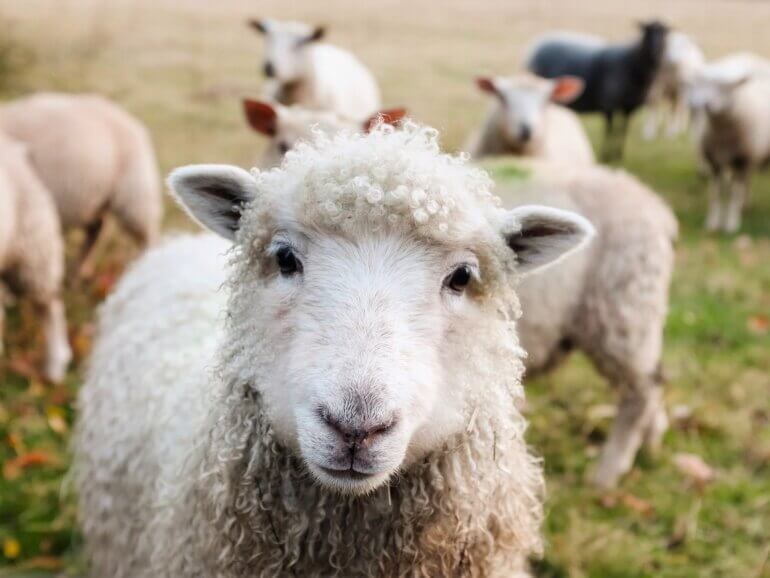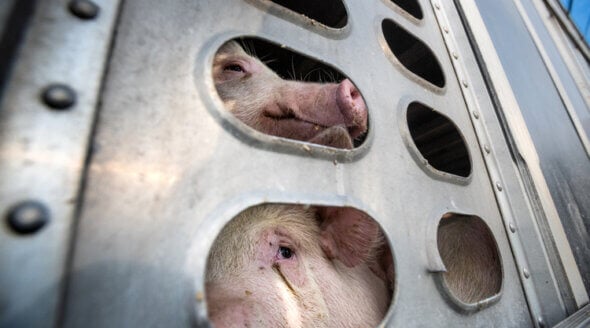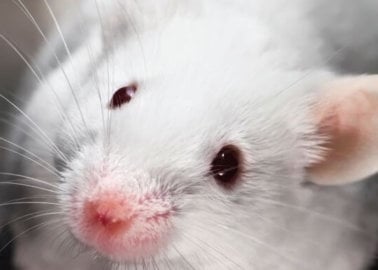Exciting News: England and Wales to Ban Live-Animal Exports!
Get ready to celebrate! The environment secretary has revealed plans to ban the export of live animals as the government moves to strengthen UK animal protection laws following Brexit.
What Does This Mean?
Live animals are exported in their thousands from the UK for fattening and slaughter every year. They endure prolonged suffering during stressful journeys that often result in injuries, disease outbreaks, and even death. The UK was previously unable to ban live export as a member of the EU. In 2012, Kent’s Thanet District Council tried to suspend live-animal exports, but its order was overturned by the High Court as a breach of EU free-trade rules.
PETA has been campaigning against live export years, during which tens of thousands of supporters have taken action to help shut down this cruel industry.
Brexit may have divided the country, but almost everyone will agree that live-animal export is cruel and must end. Now that the UK has the freedom to stop live export, we’re glad to see the government finally taking action. This ban will make the UK the first European country to end this terrible practice. We hope the government will continue to lead the way by making further changes to the industry and including chickens in the ban – and we’ll continue calling for a ban in Northern Ireland, which exports thousands of pigs, sheep, chickens, and calves to Europe each year.
Why Are We Celebrating?
The export of live animals is an unnecessary practice that causes extreme animal suffering. Most animals raised for their flesh already endure the misery of confinement and the heartbreak of being forcibly separated from their babies. The least we can do is spare them the unnecessary trauma of an arduous journey overseas before they’re killed.
Subjected to long journeys and exposed to horrendous weather, they’re forced to marinate alive in their own waste on the vehicles. They may be in transit for days, often without sufficient food, water, fresh air, or veterinary care. Many are trampled to death in the crowded lorries, die from exposure, or simply starve. Those who survive the horrendous journey are eventually slaughtered.
The rules on live export are commonly broken – a report by the European Commission recently outlined the many ways animals are being failed. They often have to endure excessively long journeys and severe crowding and may be left waiting in lorries at ports for hours and hours without being unloaded. In addition to routine suffering, long-distance live transport can also result in fires, and ships may sink, causing the suffering and deaths of large numbers of animals. Most recently, in November 2019, a ship transporting 14,600 sheep capsized shortly after leaving port. Following many days of rescue attempts, only 180 sheep survived the disaster.
Video footage from a capsized ship in Romania with 14,000 sheep onboard. This is the reality of live export. Don’t wanna support this? Then stop eating meat. pic.twitter.com/1bECx8HOgC
— Ari Solomon (@VeganAri) November 25, 2019
Pandemic Risk
As if the cruelty to animals weren’t enough, transporting live animals thousands of miles in cramped, filthy conditions is also a major cause of the spread of zoonotic diseases around the globe, from foot-and-mouth disease and avian influenza to SARS. Even though the COVID-19 pandemic halted global travel for humans, the shameful trade in other animals between countries continues – posing a danger to all of us.
Where Do We Go From Here?
The ban on live-animal exports from England and Wales is a huge milestone, but we want to ensure all animals benefit from it. Chickens, who can suffer every bit as much as sheep and cows, must not be left out of the new legislation, and animals shouldn’t be allowed to suffer in perilous journeys beginning in Northern Ireland, either. That’s why we’ll be taking part in the government consultation on the proposed ban to call for everyone to be included in the new legislation.
Help us give Ireland a reason to celebrate, too. Speak out against the live export of cows and other animals from Irish shores:





